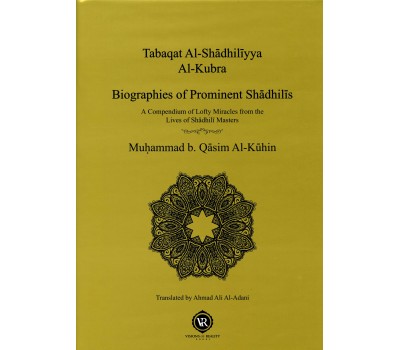Tabaqat Al-Shadhiliyya Al-Kubra Biographies of Prominent Shadhilis
- Product Code: BK4788
- Availability: In Stock
- Book Binding: Hardback
- Book Author: Muhammad b. Qasim Al-Kuhin, Translated by Ahmad Ali Al-Adani
-
£35.00
Al-Kuhin’s Tabaqat Al-Shadhiliyya Al-Kubra is a collection of biographies of Sufi Masters from the Shadhili Tariqa. Selections are included from other works, and in total details of the lives of nearly 100 of the Awliya spanning some eight centuries are included.
The Quran tells us of a category of people for whom ‘there is no fear and nothing to grieve’, these people the friends of Allah – the Awliya Allah (Surah Yunus: 62-63), are the inheritors of the Prophets (peace be upon them all). Through them humanity has benefited for centuries.
The Sufi Tariqas developed along the same lines as the madhabs (Schools of Fiqh) and represent the science of Ihsan in traditional Islamic teachings of Ahl al-Sunnah wal Jamah. Of these Tariqas, one of the greatest in the world of Islam is the Tariqa Shadhiliyya based on the teachings of, and named after Abul Hasan al-Shadhili (d. 1258).
Abul Hasan al-Shadhili, who was born in the tribe of Ghumara in Morocco to a sharif family descended from the Prophet’s grandson al-Hasan. The teachings of Abul Hasan al-Shadhili stress the importance of spiritual purification, the perfection of moral character, and the adoption of pietistic etiquette (adab). There is an emphasis on adherence to the Shariah, lifelong learning and gratitude to Allah the Almighty, due to which the Tariqa Shadhiliyya is also known as the Tariqa of gratitude (shukr).
The Tariqa is also associated with considerable scholarly erudition in the traditional Islamic fields of learning, with large numbers of scholars being its adherents, resulting in extensive contribution to Islamic literature in general but literature concerned with Sufi theory and practice in particular.
The Sufis in general and the Shadhilis especially have absolute dedication and devotion to the Prophet r, something that this book shows in detail for example in the entry on Sayyidi Abu’l-Abbas al-Mursi we find:
He would say: ‘For forty years I have not been veiled from the Messenger of Allah r even for the blinking of an eye, and had that occurred I would not have counted myself from the Muslims.’
Also in the book regarding Sidi ʿAlī al-Jamal ʿImrānī (d. 1194 AH) we find the following:
He was always able to see the Prophet r whether he was asleep or awake, and said, ‘Whenever the Messenger of Allah r comes to my mind, I find him in front of me along with the Ten Promised Paradise – physically present, not only spiritually. We speak with them and learn knowledge and action directly from the source of knowledge and action, may Allah bless him and give him peace.’ His student Mawlāy al-ʿArabī al-Darqāwī said about him, ‘By Allah, our shaykh Mawlāy ʿAlī al-Jamal was even more engrossed in the being of the Messenger of Allah r than Abū al-ʿAbbās al-Mursī.’
.jpg)
